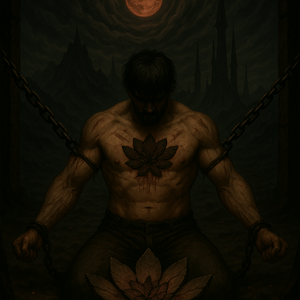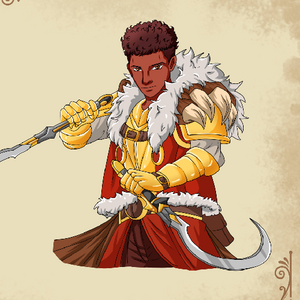The night draped the Ironshadow Sect in a shroud of silence. Under a moon obscured by tattered clouds, the high stone walls and black-tiled roofs of the sect’s compound loomed like the ribcage of some slumbering beast. In the courtyard’s far corner, a lone servant boy scrubbed the flagstones. By the dim light of a dying lantern, his rag cloth moved in trembling circles, smearing muddy water over cold granite. He had no name worth remembering, not here. Just another drudge in tattered grey robes, a shadow among shadows.
Tonight, the boy’s breaths came shallow and quick. Fever radiated off his skin, each movement sending a hot ache through his thin arms. He knew he should have been resting in the servants’ quarters—his cough had worsened since dawn—but an unfinished chore meant punishment. And punishment in Ironshadow Sect was a mercy no one received. So he worked on, biting back coughs, trying to ignore how the world swayed if he stood too fast. The bucket beside him was half empty and the water long since gone cold. Still, he dutifully dipped his rag, wrung it out with shaking hands, and continued scrubbing.
A pair of booted feet stopped just at the edge of the lantern light. The boy froze. Slowly, he lifted his gaze. Above him towered a man in the dark steel-and-charcoal uniform of an inner disciple. The disciple’s face was young—perhaps not much older than twenty—but his eyes carried the predatory calm of someone who had power and was used to wielding it without question. In the flicker of lantern-light, the boy saw the glint of the sect’s sigil, an iron lotus, etched on the man’s belt clasp.
“Why are you here so late?” the disciple asked softly. Too softly. His voice was almost gentle, and that made it all the more terrifying.
The servant scrambled to his knees and bowed until his forehead touched the wet stone. “F-forgive me, young master,” he stammered, his voice raw. “I… I am cleaning the courtyard as ordered. It wasn’t finished by sunset… I’m sorry.”
The disciple’s boots stepped forward, splashing in the dirty puddle of water. “Still not finished?” he murmured. “Slow. You’re far too slow.”
The boy flinched, pressing his forehead harder to the ground. A surge of dread cut through the feverish haze in his mind. “I’ll work faster, young master. Please, I beg—just a little more time.”
There was a sigh above him, almost bored. “Raise your head.”
For a moment, he hesitated. Past experience told him not to look a disciple in the eye without permission. But the command had been clear. The boy lifted his head from the stone and knelt upright. He kept his eyes low, focused on the iron buttons of the disciple’s robe. Even so, he could see the man’s hand resting lightly on the hilt of a sheathed sword.
“You’re pale and sweating,” the inner disciple observed. “Are you ill?”
The question was not kindly meant; the edge beneath those words was sharp as a dagger. The boy opened his mouth, uncertain of the safer answer. If he admitted illness, he might be accused of weakness. If he lied and his sickness became obvious…
“I… just a slight fever,” he whispered at last. “It will pass.”
The disciple hummed as if considering this. “A fever. I see. So you are weak.”
Lightning panic shot through the servant’s chest. He shook his head frantically. “No, no, I-I can still work. It’s nothing. Please, have mercy—”
“Silence.” The disciple’s voice remained quiet, but now it dropped into a cold register that echoed in the empty courtyard. He drew his sword in a fluid motion. The steel caught the meager light, a thin blade of midnight reflecting the moon.
Kneeling in the grime, the servant boy felt all warmth flee his body. His fever, his exhaustion, all forgotten—replaced by stark, animal terror. He knew what came next. “Young master…” he choked out, tears pricking his eyes. “Please, I—my duty—my family needs—”
The inner disciple looked down at him with a faint curl of distaste on his lips. To him, this boy groveling at his feet was not a person at all, merely dirt that dared to cling to his boot. He raised his sword and angled it toward the boy’s neck. “The weak,” he intoned, as if reciting a lesson, “are not punished.”
For a heartbeat, confusion flickered in the servant’s tear-filled eyes. The blade flashed. A spray of blood hit the lantern, dousing its flame with a sizzle.
“They are erased,” the disciple finished quietly.
The boy’s body toppled forward, dark blood pooling under his slack face. His eyes, which had widened at the disciple’s cryptic words, now stared sightless at the stone he had been scrubbing.
The inner disciple flicked his sword to the side, casting off droplets of red, then slid the blade back into its sheath. He stepped over the corpse without another glance. “Dispose of that,” he said sharply into the shadows.
From the darkness at the edges of the courtyard, two other servants emerged—their expressions blank, resigned. This was not the first nameless life snuffed out in Ironshadow Sect, nor would it be the last. Wordlessly, they lifted the limp body by the arms and ankles. Blood dripped in a trail behind them as they carried their fallen fellow away into the night. In minutes, even the stain on the stones would be washed clean.
Silence reclaimed the courtyard. Above, the clouds drifted aside, and cold moonlight poured down. It shone on the damp, empty ground where moments ago a boy had pleaded for his life. Now nothing remained—no sign he had ever been there at all.
In the world of Murim, such is the fate of the powerless. Sects, clans, and cults maintain a ruthless balance, each vying for strength and dominion. Yet even among these, the Ironshadow Sect is known for its unforgiving creed. Here, mercy is a myth and weakness a sin. A servant without strength is less than nothing, destined to vanish without even a whisper of remembrance.
By dawn, no one would recall the boy who had labored under fevered moonlight. His name—if he’d ever been given one—meant nothing now. In Ironshadow Sect, the truth is brutally simple and endlessly repeated: the weak do not merely suffer. They are erased.












Comments (1)
See all